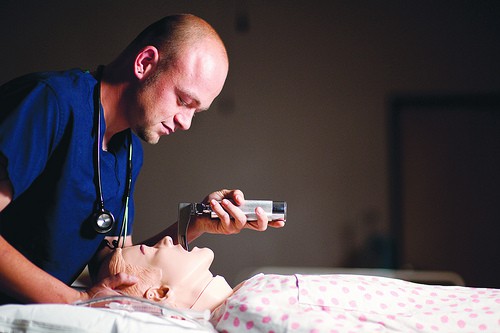Why Study Respiratory Care at Carrington College?

If you’re considering a career in health care, why not consider becoming a Respiratory Therapist?
Respiratory Care provides relief to those who have difficulty breathing, or can’t breathe on their own because they have impaired or non-functioning lungs. As a Respiratory Therapist you will apply your expertise to practical clinical problems that patients ranging from newborns to the elderly face.
Most Respiratory Therapists work in hospitals, but a growing number are being employed in physicians’ offices, hyperbaric oxygen units, skilled nursing facilities, laboratories, even medical flight transports. The Respiratory Care Program at Carrington College mixes formal classroom instruction with hands-on laboratory exercises, and clinical experience, if successfully completed, you earn an Associate of Science degree.
As a Respiratory Therapist you can treat a variety of conditions including asthma, bronchitis, lung cancer, stroke, heart attack, and birth defects to name just a few. You could also treat trauma victims and surgery patients; along with these, you can be involved in education and rehabilitation services, as well as diagnostic testing.
Designed to help our students meet the stringent standards set by the National Board for Respiratory Care (NBRC), our Respiratory Care Program is the first step on the path to qualification. Once you have your Associates degree from Carrington College, you then have to pass an NBRC credentialing exam called the Certified Respiratory Therapist (CRT) exam. CRT is the entry-level credential for the field of respiratory care; it is a national credential that must be obtained prior to state licensure.
Once you have qualified as a CRT, you can then choose to take further exams to qualify as a Registered Respiratory Therapist (RRT). In some facilities you might find that CRTs and RRTs perform the same duties, but in others only RRTs are allowed to work in certain critical care areas. That’s why RRTs usually earn higher salaries than CRTs, as well as having greater choice when it comes to their career path.
If you’re considering studying for a sought-after health care career, then perhaps you should talk to an Admissions Representative. Respiratory Care classes are enrolling now at our Carrington College Mesa campus, at our Phoenix Westside campus, and at our Carrington College Las Vegas campus.
You can find out more about the Carrington College Respiratory Care Associate Degree program at
https://carrington.edu/degrees/respiratory-care/ or by using the Live Chat feature on that page.